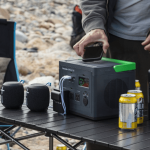Enclosed car trailers are a popular choice for car enthusiasts, motorsport professionals, and businesses that need to transport vehicles from one location to another. However, these versatile trailers can also be converted into a mobile workshop, offering a convenient and functional workspace for a variety of applications. Whether you’re a contractor, artist, or hobbyist, converting an enclosed car trailer into a mobile workshop can provide you with a portable, customizable workspace that can go wherever you go. In this post, we’ll take a look at some essential tips to help you convert an enclosed car trailer into a mobile workshop.
Assessing Your Needs and Planning the Conversion
Before you begin, you should first assess what exactly you need from your mobile workshop, and plan accordingly. This should include identifying the types of tools and equipment you will need to bring with you and ensuring that there is sufficient storage space available, as well as considering features such as lighting, power outlets, ventilation, and climate control. Additionally, you should evaluate the structural integrity of the trailer and determine whether any reinforcing or modifications will be necessary to accommodate your needs. Taking the time to thoroughly evaluate your needs and plan the conversion process will ensure that your mobile workshop meets your requirements and is functional for your business or personal use.
Choosing the Right Trailer Size and Layout
The size of the trailer will depend on the type of equipment and tools you plan to bring along with you, as well as the amount of space you need to work comfortably. It’s important to consider not only the size of the trailer, but also the layout that will work best for your specific needs. This includes factors such as the placement of doors, windows, and interior shelving or storage compartments. Taking the time to carefully plan out your trailer’s size and layout before beginning your conversion project will help ensure that your mobile workshop meets your exact needs and allows you to work efficiently and comfortably, no matter where you go.
Electrical and Lighting Upgrades
When converting an enclosed car trailer into a mobile workshop, electrical and lighting upgrades should be a top priority. Upgrading the electrical system will provide a safer and more reliable power source for all of your equipment. Depending on the tools and machinery you plan to use, you may need to add additional electrical outlets, circuits or a generator. Lighting is also an important factor for any mobile workshop, as it will ensure that you have a well-lit and safe working environment. Upgrading to high-quality LED lighting will not only provide ample lighting, but also save energy and provide a longer lifespan. It is important to consult a licensed electrician to assess the electrical needs and make sure all upgrades are up to code and meet safety guidelines.
Heating and Cooling Systems
The environment of the workshop greatly affects the productivity of the workers, and it is crucial to have a comfortable temperature that will not hinder their work efficiency. The type of heating and cooling system will depend on the geographic location of the trailer and the climate of the area. Various options may include air conditioning units, propane furnaces or heaters, and various types of insulation. HVAC professionals can assist in determining the best heating and cooling solutions for your specific needs and advise on how to install the systems safely and efficiently.
Workbench and Storage Solutions
Workbench and storage solutions are crucial components that need to be considered in this regard. A sturdy workbench made from quality materials, such as steel, aluminum or wood, can withstand heavy-duty tasks and provide a stable surface for precision work. Additionally, incorporating storage solutions such as drawers, shelves, cabinets, and tool racks will greatly improve organization, accessibility, and safety. Careful consideration should be given to the size, layout, and placement of the workbench and storage solutions to ensure optimal use of space and ease of movement within the mobile workshop. With proper planning and execution, the workbench and storage solutions will ultimately contribute to a functional and efficient mobile workspace.
Flooring and Wall Covering Options
For the flooring, you may opt for options such as plywood, rubber, or industrial-grade carpeting to provide a stable and comfortable base for work activities. On the other hand, when it comes to wall covering, the ideal materials are those that can withstand heavy impact, moisture, and temperature changes while remaining visually appealing. Popular wall covering options include aluminum sheets, insulated foam panels, and sturdy PVC wall cladding, among others. Ultimately, your choice should be guided by factors such as ease of maintenance, cost, and longevity so that you can create a workspace that meets your needs and enhances the productivity of your mobile workshop.
Plumbing and Water Supply
Depending on the type of work you’ll be doing, you may require running water for cleaning, handwashing, or even bathroom needs. Before starting your conversion, it’s crucial to plan and design your plumbing system carefully to ensure proper function and safety. Consider the size of your water tank, how the water will be heated, the type of plumbing fixtures to be installed, and how the wastewater will be disposed of. It’s highly recommended that you consult with a licensed plumber to ensure that your plumbing system complies with local codes and regulations.
Safety Considerations and Equipment Requirements
Before beginning any work on the trailer, it is essential to evaluate the trailer’s structural integrity, including the frame, axles, and suspension system. Any signs of damage or wear should be addressed immediately to ensure a safe and stable platform. Additionally, safety equipment such as jacks, jack stands, and wheel chocks should be used when lifting the trailer or working underneath it. Adequate ventilation, lighting, and fire safety measures, such as smoke detectors and fire extinguishers, must also be installed for safe working conditions. Other safety considerations include appropriate storage for hazardous materials and tools, as well as the use of personal protective equipment (PPE) such as gloves, safety glasses, and respirators.
In conclusion, converting an enclosed car trailer into a mobile workshop is a practical solution for those who need a mobile workspace but don’t want to invest in a full-sized RV. With just a little bit of planning, creativity, and some basic tools, you can transform an ordinary trailer into a versatile workspace that meets all of your needs. Whether you’re a mechanic, woodworker, or any other type of tradesperson, a mobile workshop can save you time and money while giving you the freedom to work on your projects wherever you need to go. So why not start planning your own mobile workshop today?









